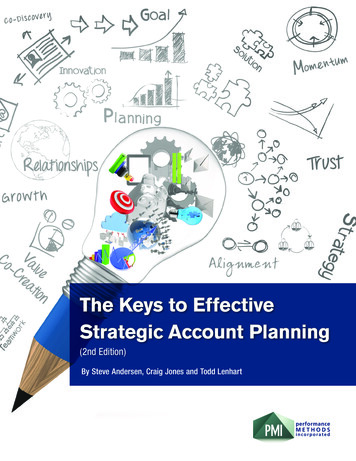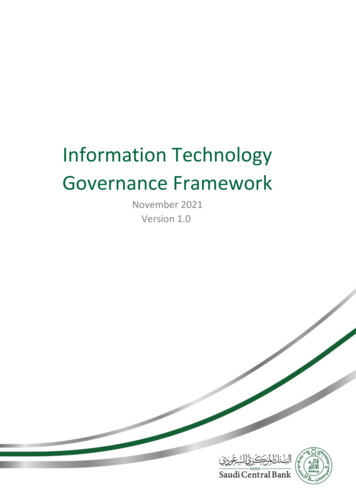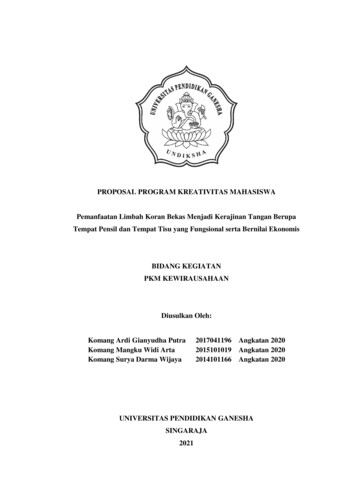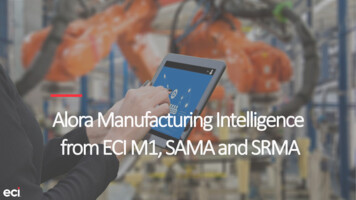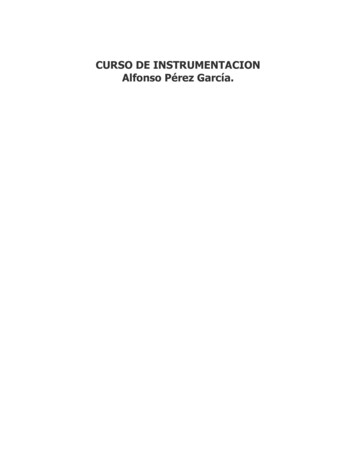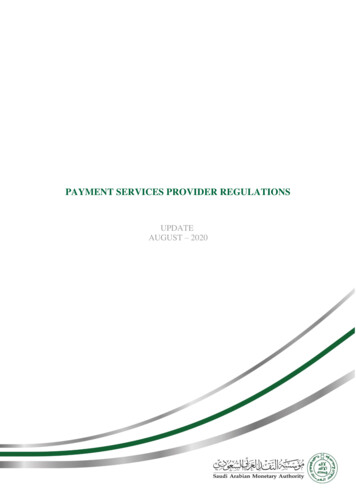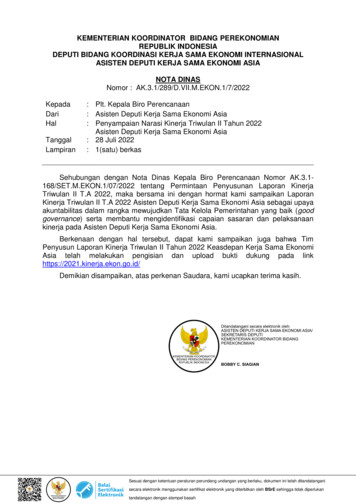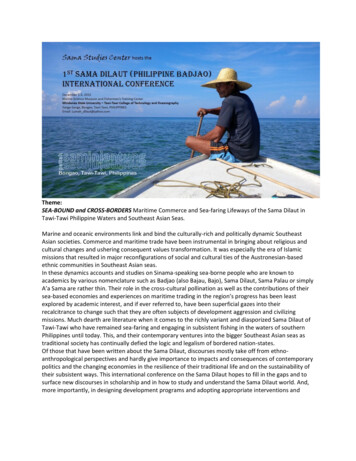
Transcription
Theme:SEA-BOUND and CROSS-BORDERS Maritime Commerce and Sea-faring Lifeways of the Sama Dilaut inTawi-Tawi Philippine Waters and Southeast Asian Seas.Marine and oceanic environments link and bind the culturally-rich and politically dynamic SoutheastAsian societies. Commerce and maritime trade have been instrumental in bringing about religious andcultural changes and ushering consequent values transformation. It was especially the era of Islamicmissions that resulted in major reconfigurations of social and cultural ties of the Austronesian-basedethnic communities in Southeast Asian seas.In these dynamics accounts and studies on Sinama-speaking sea-borne people who are known toacademics by various nomenclature such as Badjao (also Bajau, Bajo), Sama Dilaut, Sama Palau or simplyA’a Sama are rather thin. Their role in the cross-cultural pollination as well as the contributions of theirsea-based economies and experiences on maritime trading in the region’s progress has been leastexplored by academic interest, and if ever referred to, have been superficial gazes into theirrecalcitrance to change such that they are often subjects of development aggression and civilizingmissions. Much dearth are literature when it comes to the richly variant and diasporized Sama Dilaut ofTawi-Tawi who have remained sea-faring and engaging in subsistent fishing in the waters of southernPhilippines until today. This, and their contemporary ventures into the bigger Southeast Asian seas astraditional society has continually defied the logic and legalism of bordered nation-states.Of those that have been written about the Sama Dilaut, discourses mostly take off from ethnoanthropological perspectives and hardly give importance to impacts and consequences of contemporarypolitics and the changing economies in the resilience of their traditional life and on the sustainability oftheir subsistent ways. This international conference on the Sama Dilaut hopes to fill in the gaps and tosurface new discourses in scholarship and in how to study and understand the Sama Dilaut world. And,more importantly, in designing development programs and adopting appropriate interventions and
modalities towards tomaking life better for them. Innovative models and frameworks are hoped to emerge, complementingand enriching alternative perspectives of discussing and presenting the Sama Dilaut contemporary seaworld.By encouraging a 180-degree turn-about of the front-gates of scholarship and development programsback to the sea and the maritime world, this conference hopes to encourage and popularize alternativeframeworks and innovative models in figuring the Sama Dilaut world both metaphorically andpragmatically.While not so much about novel experimentation, finally, this meeting of scholars, scientists, statesmenand development actors with the Sama Dilaut themselves is an opportunity to look back to what hasalways been held by the Sama Dilaut as their life-ways since time immemorial and as traditional, and tocommit to give them renewed winds to sail and to secure abundant seas that may facilitate theirjourney to reclaim their space and reorder their present realities.Objectives:To strengthen research and encourage academic interest on the plight and situation of the SamaDilaut (Badjao) by highlighting their roles in the social and cultural development of the Sama society,and their contributions to the dynamics of maritime and sea-based economy in Tawi-Tawi and thePhilippine waters, and the impact and consequences of geopolitics in Southeast Asian region in thisroles and contributions;To discuss development models and survey affirmative actions, and evaluate empowerment programsand interventions for this most marginalized of Sama ethnic communities; andTo provide venue and spaces for the Sama Dilaut to tell their narratives and as well as for listening toalternative voices speaking as interlocutors for Sama Dilaut issues.
Panels. Presenters and ThemesThis Conference is a close conference and speakers are purposively sought and invited to present in theforums as resource persons or as panel of reactors. Interested scholars, social and natural scientists, aswells as development strategists, government officials and cultural practitioners are encouraged toattend and interact with the panel of expert discussants. Inquiries may be addressed to the ConferenceChairman and/or the Co-ChairmanInternational:The conference shall create spaces for dialogue between these foreign scholars and researchers withtheir local Sama Dialut informants with the aim of revalidating, reaffirming or, if needs be, rectifying,reconstructing and updating their findings as well as recommending areas for further engagements byfuture scholars.Philippine scholars and researchers and their counterparts of foreign nationalities coming fromcountries outside of the Philippines who have studied and conducted fieldworks with Sama Dilaut inTawi-Tawi and elsewhere in the Philippines hold conversations with their Sama Dilaut respondents andhosts.- Profs. Harry Arlo Nimmo (U.S.A.)- Dr. Leslie Bauzon- Jun Nagamatsu (Japan)- Nagatsu Kazufumi (Japan),- Alice Dugan and Marlena Skobe (USA)- Dr. Eric CasinoNational:Legal and development experts from national agencies such as the Philippine Commission on HumanRights (PCHR), the National Commission on Culture and the Arts (NCCA), National Commission onIndigenous People (NCIP), Autonomous Region on MuslimMindanao (ARMM) and the Local government
of the Province and Municipalities of Tawi-Tawi, by drawing from their experiences of directengagement with indigenous people and those in the margins, are important stakeholders from thegovernment and development sector who can provide a perspective to shed light on aspects of politicsand development that has impacted and has implications on the prospects of Sama Dilaut andalternatives available to them.- Atty. Cecilia Jimenez- Atty. Laisa Masuhud Alamia- Atty. Raissa JajurieAcademic community and the MSU-TCTO:Scholars and academics are given a whole day to present their discourses in three Thematic Panels:1. Cultural Politics, Negotiation and Accommodation, and Marginalization;2. Economic and Social Migration, Diasporization and Sama Dilaut Crossing Borders; and3. Development, Environment and Towards Building Safer Seas for the Sama Dilaut.Complementing those from national academic and research institutions and organizations, faculty andstaff researchers from the MSU-TCTO will be given the chance to present their studies and reports ontheir engagements and actions with the Sama DilautDATES TO REMEMBERSubmission of abstracts: 15 September 2015Notice of acceptance: 20 September 2015Full paper: 30 October 2015CONFERENCE SECRETARIATSama Studies CenterOffice of the Chancellor2nd Floor Sabdani Bulante BuildingEmail: lumah dilaut@yahoo.com (alt: ANIZING COMMITTEEAtty. Lorenzo R. Reyes, Chancellor, MSU-TCTO (Conference Chairman)Prof. Abduljim J. Hassan, Director, Sama Studies Center (Conference co-chairman)Prof.SUPPORTING INSTITUTIONSNational Commission on Culture and the ArtsBureau of Cultural Heritage – ARMMUNICEFAsian Public Intellectuals – API PhilippinesPhilippine Association for the Study of Culture Historu and Religion (PASCHR)CONFERENCE VENUE:Marine Science MuseumFishermen’s Training CenterTawi-Tawi College of Technology and Oceanography
MSU-Sanga-Sanga CampusSanga-Sanga Tawi-Tawi, PhilippinesCONFRENCE FEES: inclusive of kit and meals (lunch and snacks) for Dec.1-3, 2015International – USD 150.00National (Professionals) - 3,000.00National (Students) – 1,500.00
government and development sector who can provide a perspective to shed light on aspects of politics and development that has impacted and has implications on the prospects of Sama Dilaut and alternatives available to them. - Atty. Cecilia Jimenez - Atty. Laisa Masuhud Alamia - Atty. Raissa Jajurie Academic community and the MSU-TCTO:



